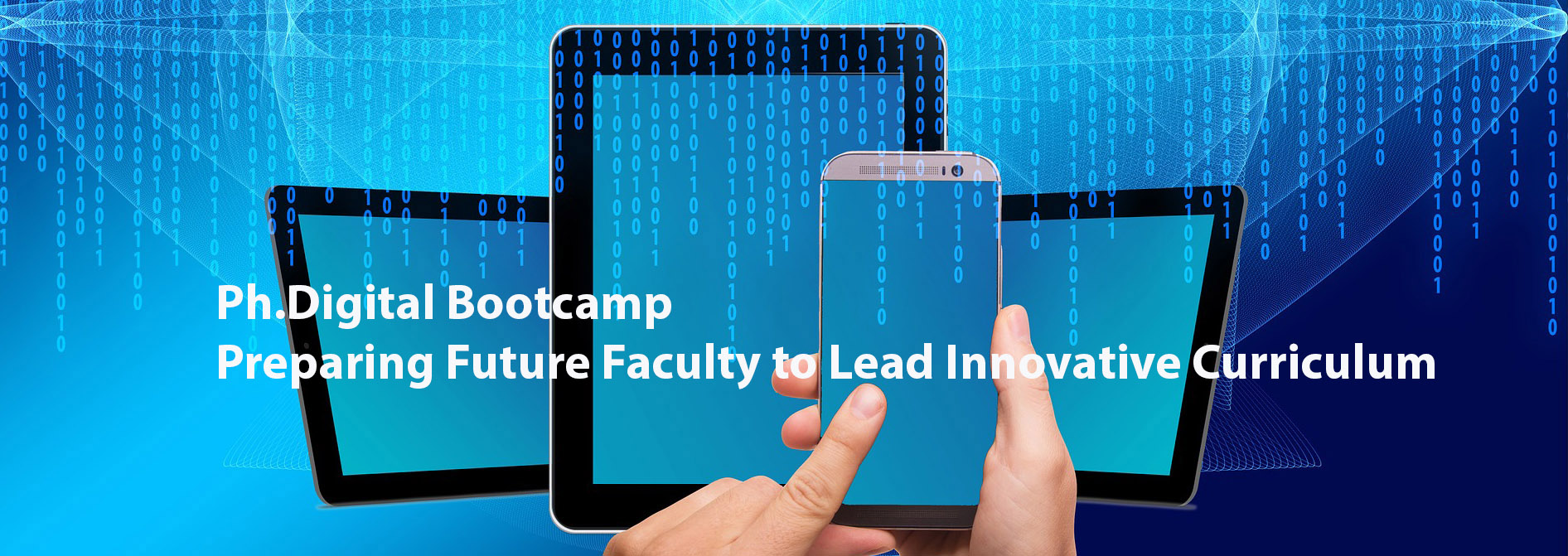
Instructor: Cindy Royal, Ph.D.
Week of May 6
Introduction
In this module, we will read and discuss research on emerging digital topics and the relationship to curriculum and pedagogy. Please review as many of these studies and resources as possible. We will have an opportunity to discuss these topics with some of the authors and leaders in this area during the Bootcamp.
Objectives
- Analyze research on emerging digital issues
- Identify publication opportunities
- Discuss challenges to performing research on digital topics and concepts
- Relate research to curriculum and pedagogical strategies
You should be able to find these items in your libraries’ online services. I have also included pdfs in the #scholarship channel on Slack.
Technology Firms Shape Political Communication: The Work of Microsoft, Facebook, Twitter, and Google With Campaigns During the 2016 U.S. Presidential Cycle, Political Communication, Daniel Kreiss & Shannon McGregor, 2018 – this article provides a fascinating look at how technology companies assisted the Presidential campaigns in 2016. I feel this type of work will need to be continued to better understand the broad reach of companies like Facebook and Google. Shannon McGregor will be joining us on Skype during the Bootcamp. The study was featured in Politico before it was published in the academic journal.
Algorithmic Transparency in the News Media, Digital Journalism by Nicholas Diakopolous and Michael Koliska – this article discusses the opportunities and ethics of the use of algorithms for news production.
Location-based news in mobile news apps: Broadcast leads in geolocated news content, newspapers lag behind, Newspaper Research Journal, Amy Schmitz Weiss, 2018 – this article studied the way that news organizations are employing location-based services. In an increasingly mobile world, it will be important to understand how traditional media incorporates these and other features. Amy Schmitz Weiss will be joining us via Skype during the Bootcamp.
Amy is also the Research Chair for the International Symposium on Online Journalism. I highly recommend reviewing all their recent content and looking through their research. Below is the video from April 14, 2018. Please watch the interview with Evan Smith and Ben Smith and the following panel on Tech Trends in Journalism. ISOJ always assembles the most provocative professionals and scholars, and it is a conference that any digital educator should put on their calendar!
Zeynep Tufekci is a professor in the School of Information at the University of North Carolina. She articulates some of the moral issues associated with machine learning (artificial intelligence).
Publication Opportunities
One of the items I’d like you to discuss is the challenge of getting new and emerging ideas published in traditional journals, you know, the ones that count for tenure. Many are slow to publish, which makes them less relevant for digital trends that are fast-paced. And the methods that are valued in traditional journals may not be the right approaches for new topics. Here are some articles published in new places that allow research to reach a broader audience more quickly.
The Bots Beat: How Not to Get Punked By Automation, CJR by Nicholas Diakopolous
The Programmer Majored in English, Nieman Journalism Lab by Megan Garber – Nieman Lab is known for elevating emerging research topics to a broader audience. This article addresses the study I did with the NYT Interactive News Technology team in 2009. Note that this study was rejected by AEJMC. However, after presenting it at ISOJ, it received attention for being one of the first studies on the emerging role of data journalism. As you know, Nieman Lab also does the annual predictions which engage a bevy of big thinkers in exploring the items they think will be important in the future.
My article The Journalist as Programmer: A Case Study of the NYT Interactive News Technology Department was eventually published in the ISOJ Journal (download pdf).
Research centers are also the home to many relevant and meaningful research projects. The Tow Center for Digital Journalism has published many articles on emerging topics. Here are two:
Post-Industrial Journalism: Adapting to the Present (find pdf on Slack) by C.W. Anderson, Emily Bell and Clay Shirky. CW Anderson will join us on Slack during the Bootcamp. Anderson is also the co-editor of Remaking the News: Essays on the Future of Journalism Scholarship in the Digital Age.
The Art and Science of Data-Driven Journalism (find pdf on Slack) by Alexander Howard.
Teaching Data and Computational Journalism (find pdf on Slack) by Charles Berret and Cheryl Phillips.
Research Centers – here are a few other research centers doing important digital research.
Center for Media Engagement, The University of Texas.
Pew Research Center – Internet and Technology
Curriculum and Pedagogy
We’ve covered a lot of ground over the last 10 weeks! As we head into the in-person portion of the Bootcamp on May 15, we’ll want to keep curriculum in strong focus. The challenge in this dynamic, digital world is keeping up with changing topics AND being able to teach them. This is no easy task. In addition to the specific skills a student learns in a program, I feel that a certain mindset must emerge to cope with and be successful in this environment. I will be interested in your thoughts.
Amanda Bright, 2018 PhDigital Bootcamp graduate, will be joining us via Skype on Sunday, May 19 to discuss her first year at Grady College at University of Georgia and how she has been able to infuse innovation in her curriculum. Here is an article she published in 2018 about cultural implications of curriculum change.
A Qualitative Look at Journalism Programs in Flux: The Role of Faculty in the Movement Toward a Digital Curriculum, Amanda Bright, Teaching Journalism and Mass Communication, 2018.
Articles I’ve Written on Curriculum Issues – these articles track some of the thinking over time that went into our curriculum changes that you read about in our module on Product Management.
Journalism Schools Need to Get Better at Teaching Tech Where the Girls Are – I have long written about the opportunity (and responsibility) to teach tech skills to women in our disciplines with high percentages of women
At the Intersection of Journalism, Data Science and Digital Media: How Can J-Schools Prep Students for the World They’re Headed Into – Amy Schmitz Weiss and I separately tackle issue regarding digital curriculum.
We Need a Digital First Curriculum to Teach Modern Journalism – some early writing on curriculum issues
Why Universities Need to Embrace Coding Across the Curriculum – I make the case that coding should be taught broadly across the university, not just in computer science, because all disciplines have problems that can be addressed via programming.
Other Articles on Emerging Tech, Skills and Curriculum
Teaching Data Journalism: A Challenge for Every University , Data-Driven Journalism, 2018
Four Takeaways for Virtual Reality in Journalism and Education , MediaShift, 2016
Why Journalism Students Need a Baseline Understanding of Coding , MediaShift, 2015
The Future of Education: How A.I. and Immersive Tech Will Reshape Learning Forever , Medium, 2017
Superpowers: The Digital Skills Media Leaders Say Newsrooms Need Going Forward, Tow Center for Entrepreneurial Journalism (find pdf on Slack).
Global Journalism Education in the 21st Century – I contributed a chapter in this on Coding the Curriculum
Coding Pedagogy edited by Jeremy Sarachan, 2019. I contributed a chapter on teaching my Mobile App Development course.
There are additional items on the Resources page of this site.
Discussion
You have been introduced to many studies and topics in this module. How will you make sense of this in your own academic careers? Use the #scholarship channel.
- I’d like you to discuss the opportunities and challenges associated with researching emerging topics. What areas do you find most fruitful for your research agenda? Why? What are some ways that you might begin to measure or analyze these trends?
- What challenges do you see in terms of publishing this type of work? What venues do you think are most relevant? How does that fit into your goal of achieving tenure, and what are some strategies you think you will need to develop to deal with this environment?
- What are the challenges and opportunities you see in integrating these topics in curriculum at the places where you are studying and working (or wish to work)? Address at both the undergraduate and master’s level. What programs do you think are the most innovative in their approaches to digital curriculum?
- And how about doctoral education? Now that you have been through these modules, how do you think doctoral programs should change? What are the challenges? And what are the risks if they don’t? Think about both short-term and long-term effects. As PhDs, how can we be responsible to our students in providing them the best foundation for future success through our own preparation?
- And please provide links to any additional resources or studies you find relevant.
Congratulations on making it to this point in the Bootcamp! We are looking forward to seeing you all in San Marcos and delving further into all these topics.
